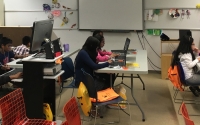STEM for Kids + Teen Workforce Development
Queens Library, N.Y.
Innovation Synopsis
Queens Library partnered with Google to be the first library to offer Google CS First Clubs (STEM education/coding) for 4th-8th graders, coupling the program with a high school internship program. Teens will be trained in coding and will work at libraries assisting and boosting their own skills and employability.
Challenge/Opportunity
Increased STEM education is critical to future employability and develops problem-solving and math skills that apply to other areas of life. Programs that teach children/teens computer skills are expensive for libraries, as they are tech-heavy with no economy of scale – 1:1 ratio of computes to participants. Staff also need specialized training in coding languages etc. Workforce development programs for teens are also highly desirable for teens’ futures as well as the Library, which always needs the extra hands. Funds to pay them are scarce and they require more training and supervision than their adult counterparts.
Key Elements of Innovation
Google CS First is a curriculum for computer science learning that has been used in schools. Queens Library piloted adapting it to a library environment by creating topical cohorts (e.g., music, game design, fashion) in 26 libraries this summer. Cohorts are ten children and provided with laptops loaded with Scratch coding language and earphones. Cohorts have eight program hours over two weeks. Twenty high school students from a charter-school internship program will be recruited, trained, and will assist. They will continue the programs in additional libraries in the fall and be paid a stipend by the NYC Department of Education.
Achieved Outcomes
More than 1,800 children pre-registered for 300 seats in the pilot summer program. They were chosen to participate by lottery. Having that measurably large demand for STEM will help secure needed funds going forward. Queens Library partnered with Google on the launch. In the past, Google donated 5,000 Nexus tablets that are loaned to Queens Library users on their borrower’s card, so there is value to solidifying the relationship. Another tangible and significant benefit is that the teen interns will be available as general technology assistants, as well as work on CS First at no cost to Queens Library.

